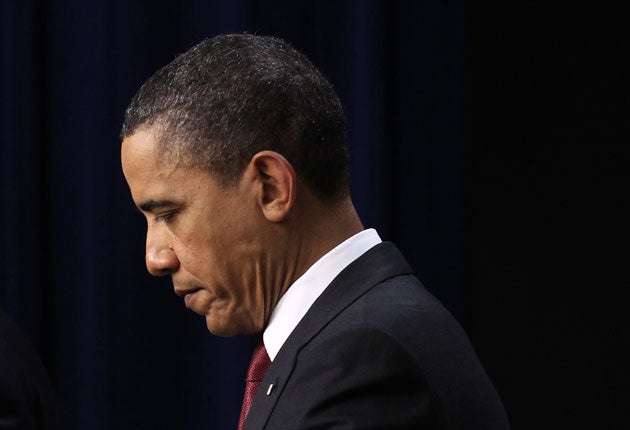Obama treads the diplomatic high wire above Cairo's streets
Washington has managed its multiple balancing act pretty well, so far, juggling its interests in Egypt's unfolding crisis

For the Obama national security team, Egypt has been a baptism of fire: its first full-blown crisis in the region where the US has more at stake than anywhere on earth – a revolution unfolding on the streets of a vital ally.
For senior officials here, the drama in Cairo has meant late nights (and very early mornings) in the Situation Room deep under the White House, not to mention endless meetings and phone calls around the world. Their task was to keep Washington's longer-term Middle East strategy on track. So far, they have made a pretty decent fist of it.
On Friday, President Obama once again stopped short of demanding the resignation of the Egyptian leader. But, he declared, an orderly transition from the Mubarak regime should start "now." Yesterday, that appeared to be happening, as the top leadership of Egypt's ruling party, including Mr Mubarak's son Gamal, resigned. The move may not satisfy the demonstrators in Tahrir Square – but for the administration it was a step in the required direction.
It may also have been in part brought about by intense outside pressure, in which the US has played a vital co-ordinating role. This time, Washington's European allies have marched in virtual lockstep on the crisis. And the domestic Republican opposition has kept quiet, allowing the White House to get America's message across unmuddled.
Inevitably, there has been grumbling at the failure of US intelligence agencies to see how fast the Tunisian contagion would spread. But as Admiral Mike Mullen, the chairman of the Joint Chiefs of Staff pointed out, the Egyptian crisis "has taken not just us, but many people, by surprise". However, the basic goal of the US – as of any great power in such a crisis – is to protect and, if possible, further its national interests. In this case US interests boil down to two related questions. What impact will an Egypt without Mubarak have on the "war on terror" and the containment of Islamic extremism, and how it will affect Arab-Israeli relations?
The first question looks easier to answer. Washington's ultimate nightmare would be a rerun of Iran, 1979: the toppling of an autocratic pro-US ruler, and his replacement by a virulently anti-American regime. Fortunately, that looks unlikely. There is no Egyptian Ayatollah Khomeini waiting in exile, while the Muslim Brotherhood, the most organised element in Egypt's opposition, has kept a low profile. Notably absent from the anti-Mubarak protests were banners proclaiming "Death to the USA".
For the moment, at least, this is not an Islamic but a secular revolution, driven by ordinary people's frustration with a regime that has failed to deliver either democracy or prosperity – and for the moment Mr Obama seems to be on the right side of it.
Regional stability is another matter. The 1979 peace treaty between Egypt and Israel, has been the anchor of what passes for that stability. And Mr Mubarak has played an important role in US efforts to secure an Israeli-Palestinian peace deal.
Now, all that can no longer be taken for granted. Any new government is bound to be less accommodating to Israel. The same goes for Jordan, the other neighbour with whom Israel has signed a treaty, and which is confronting its own calls for reform.
Nowhere is anxiety greater than in Israel, whose government was initially dismayed by Mr Obama's thinly veiled urgings to Mr Mubarak to step down. The risk, say US officials, is that Israel, once more feeling surrounded by enemies, will hunker down, and its reluctance to strike a peace deal will only grow. The message from Washington to Israeli officials last week, according to The New York Times, was "please chill out."
Somehow though, the US must navigate between its commitment to the Jewish state, and its stated aim of fostering a democratic Egypt.
So what sort of government in Cairo would best suit the US? Ostensibly, it wants elections that produce a representative government capable of leading the social and economic reforms desperately needed across the Arab world. Alas, Mr Mubarak has made sure no organised reformist opposition presently exists.
Privately, the US might prefer a retooled, civilian-led Egypt, but where the military holds real power behind the scenes.
While that scenario might buy stability in the short term, it could produce only phoney reforms that change little, and provoke another and maybe more destabilising crisis in the future.
Join our commenting forum
Join thought-provoking conversations, follow other Independent readers and see their replies
Comments
Bookmark popover
Removed from bookmarks